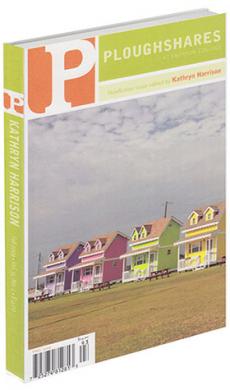Rev. of Collections of Nothing by William Davies King
Collections of Nothing, a memoir by William Davies King (Chicago): There is, perhaps, only a continuum linking habit, hobby, obsession, and pathology. William Davies King, in his new memoir, stunning and smart, insists, "I collect nothing—with a passion." Throughout this quirky little book, the author riffs on the nothing that is not there, and the nothing that is, even as he shows us the heft and substance of his collection, weighing in, he reckons, at around two tons, excluding his stash of more than eight thousand books, half that many records, and a whole lot of sheet music.
"One day," King writes, "I started to save the labels of all the food products I consumed—cereal, soup, candy, beer." Filed away, taxonomically arranged in binders and boxes, King’s collection, after twenty-five years of consuming, caching, and hoarding, has grown to seventeen to eighteen thousand labels of all sorts. A mass of things that are worth, according to the author, nothing: "The nothingness I cherish dovetails with the valuable goods discarded by others. I love it all. I love you, for what you do not love, what you throw away. There’s a sad paradox in that. I love you for your lack of love for what I love." It is, King says, "A celebration of material culture wrapped around a contempt for material culture. It is a burgeoning collection full of emptiness. It is a collection of nothing. That is my title, and I am its lord, its consumer and author and subject and victim."
This could look a lot like nuttiness, a fact of which the author is fully, self-hatingly aware. King allows that it took him three years to confess his hobby to a therapist. He wonders why his collection is so "laced with misery," and admits "I have seen people—friends—visibly repelled by it, as if it were some monstrosity, a huge boil or wen, gruesomely fascinating but still disgusting."
But this is a memoir filled with unexpected beauty, from the honest emotional archeology the author is willing to dive into, to lists of the different brands of tuna fish labels or bottles of water, or illustrations of examples of the remarkable variety of safety envelope linings. King shows us how to see things—detritus—differently; at the same time, we see his need to be loved, and can’t help but love him for the rawness of it. King’s creative and idiosyncratic collecting began when, as a child, he was given a stamp collection. King found his own way to collect and to order the world—by cutting out the "place postage here" markings from various envelopes and pasting them in place of the stamps he was supposed to collect.
The author wraps the story of his self—his own sad sense of worthlessness—in a riveting mediation on the hungry urge to collect. He has thought through the facets of his own oddity; he beats you to every punch, every critique of his sometimes antic style: "I fix on every pun, ready association, and ripe recollection, even of nothing other than nothing. Perhaps you’ve noticed. Having nothing is a struggle for life, just as having something is a reminder of death." What is left is a strange and moving portrait of a man in search of himself and of the magnificence created by a poet’s rage to order his unruly world. It is something indeed. —Rachel Toor’s most recent book is Personal Record: A Love Affair with Running (Nebraska, 2008 ). She teaches in the M.F.A. program at Eastern Washington University in Spokane.

